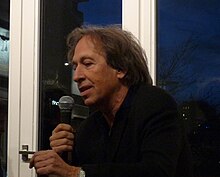Pascal Bruckner

Pascal Bruckner (born 15 December 1948 in Paris) is a French writer.
Biography
After studies at the university Paris I and Paris VII, and then at the École Pratique des Hautes Études, he became maître de conférences at the Institut d’Études Politiques de Paris, and collaborator at the Nouvel Observateur.
Pascal Bruckner began writing in the vein of the so-called "nouveaux philosophes" and counts among their best known French proponents. He published Parias (Parias), Lunes de Fiel (adapted to film by Roman Polanski) and Les voleurs de beauté (The beauty stealers) (Prix Renaudot in 1997). Among essays, La tentation de l'innocence (Temptation of innocence) (Prix Médicis in 1995) and, famously, Le Sanglot de l'Homme blanc (The Tears of the White Man), an attack on narcissistic and destructive policies intended to benefit the Third World, and more recently "La tyrannie de la pénitence" (2006), an essay on the West's endless self-criticism.
From 1992 to 1999, he was an active supporter of the Croatian, Bosnian and Kosovar causes against Serbian aggression. He supported the 1999 NATO bombings of Serbian forces led by Milosevic. In 2003, he supported the toppling of Saddam Hussein by the US forces but later criticized the mistakes of the American army and the use of torture in Abu Graib and Guantanamo.
Criticism of multiculturalism
His fiery polemic stance against multiculturalism has kindled an international debate.[1] In an article titled "Enlightenment fundamentalism or racism of the anti-racists?", which defends in particular Ayaan Hirsi Ali by criticizing other articles by Ian Buruma and Timothy Garton Ash, Bruckner draws on modern philosophers from Heidegger to Gadamer, Derrida, Horkheimer and Theodor Adorno to mount a broad attack on the Enlightenment, claiming that they argued that "all the evils of our epoch were spawned by this philosophical and literary episode The Enlightenment ]: capitalism, colonialism, totalitarianism",[1].
Later in the text, however, Bruckner advocates another form of Enlightenment different from Anglo-Saxon Enlightenment, acknowledging that "Denouncing the excesses of the Enlightenment in the concepts that it forged means being true to its spirit.[1]
Le Sanglot de l'Homme blanc
Le Sanglot de l'Homme blanc (The Tears of the White Man), published by the Éditions le Seuil in May 1983, subtitled "Third World, culpability and self-hatred", was a controversial opus. The author describes what he sees as a pro-Third-World sentimentalism of part of the Western Left-wing and its cheap self-culpabilisation. The essay had an influence on a whole trend of thought, especially on Maurice Dantec and Michel Houellebecq.
See also
Footnotes
- ^ a b c Pascal Bruckner, Enlightenment fundamentalism or racism of the anti-racists?, appeared originally in German in the online magazine Perlentaucher on January 24, 2007. Template:En icon
External links
- The Asterix complex, interview with Pascal Bruckner at signandsight.com
- Boycot Durban II By Pascal Bruckner, 16/06/2008
